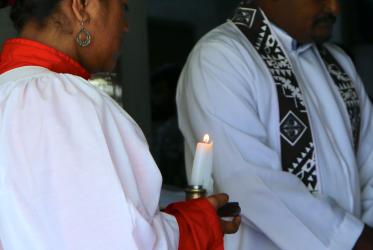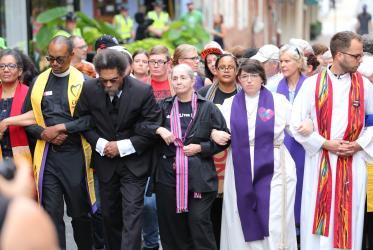Proposals for Roundtables on Partnerships
by the Ecumenical Team Financing for Development
19 March 2002
Justice is the heart of the matter and it is the heart of partnership. It is the key to the realization of human dignity and development within secure and sustainable communities. Such communities require a just and moral economy where people are empowered to participate in decisions affecting their lives, and where public and private institutions are held accountable for the social and environmental consequences of their operations. Financing cannot and must not be seen to be an end in itself. It must focus on people-centered development. But this is a concept which has been pushed to the margins of the FfD process. Justice demands the transformation of global economic governance and the international financial system so that their institutions are accountable to and serve all people, not only the wealthy and powerful. Meaningful policies and mechanisms are needed to eradicate poverty and create equitable development.
Staying engaged requires tangible commitments and actions. Engagement without demonstrated commitment is a waste of time. Genuine and just partnership requires commitment to:
- The Jubilee principle of a fresh start, to include:
- Immediate cancellation of the external debt of the poorest countries - a precondition for partnership
- Substantial debt reduction for heavily indebted middle-income countries
- The establishment of an independent and fair debt arbitration mechanism for current and future loans, which will promote ethical lending and borrowing policies.
- The principle of the primacy of fair trade, to include:
- Immediate market access for developing countries
- Elimination of the structural inequities in the global trading system - food security is essential but the current export situation creates instability, malnutrition and poverty
- Mutuality, transparency and public participation in future trade negotiations.
- Corporate Social Responsibility, (which fosters predictability and stability for investment) to include:
- International human rights frameworks to form the basis for regulatory frameworks
- Safeguarding women workers' rights in particular
- TNCs complying with principles of corporate, social and environmental responsibility, including those established by the ILO, and civil society benchmarks to assist in monitoring FDI, and public/private partnerships
- TNCs operating according to the principles of transparency, accountability, and access to information, with enforceable codes of conduct.
- New Partnerships, to include:
- Models of partnerships based on transparency and accountability, adequate resources, mutual responsibility (no public bailouts), self-reliance, local ownership and management, recognition and respect for socio-cultural context, participatory planning and sustainability
- In place of NEPAD, a return to the New Africa Initiative, which should first build dialogue and partnerships within Africa. NEPAD originated as an initiative by Africans for an accelerated program of development led by Africans. Regrettably, it has become a casualty of a model of partnership driven by the dominant global economic forces, which themselves underlie the current economic, social and cultural crises in Africa.
- The principle of democratization of the international financial system, to include:
- Full participation of civil society, without exclusion, in economic, social and political decision-making at all levels
- Strengthening ECOSOC's capacity to exercise its responsibility in the domains of development, economics, finance, trade, and social policy
- Democratizing the Bretton Woods institutions and the WTO
- Establishing within the UN system a global forum on taxation, to initiate new forms of taxes, including Currency Transaction Taxes
- Support for national and international efforts to counteract excessive tax competition and tax evasion.
Real value cannot be expressed in monetary terms, nor can life - and that which is essential to sustain it - be commodified. To "remake the world" and tackle growing inequality, concentration of power, and social exclusion, a people-centred and planet-friendly approach to financing for development is required. To the implementation of these principles and goals the ecumenical community stays engaged and committed.


